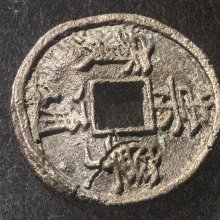Ad, Aḍ: 10 definitions
Introduction:
Ad means something in Hinduism, Sanskrit, biology. If you want to know the exact meaning, history, etymology or English translation of this term then check out the descriptions on this page. Add your comment or reference to a book if you want to contribute to this summary article.
Images (photo gallery)
(+42 more images available)
Biology (plants and animals)
Source: Google Books: CRC World Dictionary (Regional names)Ad in Ivory Coast, Burkina Faso is the name of a plant defined with Ficus sur in various botanical sources. This page contains potential references in Ayurveda, modern medicine, and other folk traditions or local practices It has the synonym Sycomorus riparia Miq. (among others).
Example references for further research on medicinal uses or toxicity (see latin names for full list):
· Journal of Ethnopharmacology (2007)
· Fitoterapia (2001)
· Journal of traditional medicines (2006)
· Flora Aegyptiaco-Arabica (1775)
· Afr. J. Trad. CAM (2005) (2005)
· Journal of Ethnopharmacology (2005)
If you are looking for specific details regarding Ad, for example extract dosage, side effects, health benefits, pregnancy safety, chemical composition, diet and recipes, have a look at these references.

This sections includes definitions from the five kingdoms of living things: Animals, Plants, Fungi, Protists and Monera. It will include both the official binomial nomenclature (scientific names usually in Latin) as well as regional spellings and variants.
Languages of India and abroad
Sanskrit dictionary
Source: DDSA: The practical Sanskrit-English dictionaryAḍ (अड्).—1 P. To try, exert, attempt. 5. P. To pervade, attain (Ved.).
--- OR ---
Ad (अद्).—2 P. [अत्ति, आद, -जघास, अघसत्, अत्स्यति, अत्तुम्, अन्न-जग्ध, जग्ध्वा (atti, āda, -jaghāsa, aghasat, atsyati, attum, anna-jagdha, jagdhvā)]
1) To eat, devour.
2) To destroy.
3) = अन्द् (and), q. v. -Caus.. to feed with, cause to eat; आदयत्यन्नं बटुना (ādayatyannaṃ baṭunā) Sk. -Desid. जिघत्सति (jighatsati) To wish to eat. [cf. L. edo, Gr. edo, Germ. essen, Eng. eat; Lith. edmi, Sans. admi, Goth. at, Zend ad] With अव (ava) to satisfy by food, get rid of with feeding; (fig.) stop the mouth of. -आ (ā) to eat &c. -प्र-सम् (pra-sam) to use up, consume, devour; समदन्त्यामिषं खगाः (samadantyāmiṣaṃ khagāḥ) Bhaṭṭikāvya 18.12.
-vi to gnaw.
--- OR ---
Ad (अद्).—a. (at the end of comp.) Eating, devouring; मांसाद (māṃsāda) carnivorous, feeding on flesh; so मत्स्य° (matsya°).
See also (synonyms): ada.
Source: Cologne Digital Sanskrit Dictionaries: Shabda-Sagara Sanskrit-English DictionaryAḍ (अड्).—[aḍa] r. 1st cl. (aḍati) To strive or endeavour. 5th cl. (aḍoti) To occupy or possess, (peculiar to the Vedas.)
--- OR ---
Ad (अद्).—[(au)] r. 2d cl. (atti) To eat. The root is imperfect; yasa being substituted for it in several inflections; as jaghāsa, &c. Implying injury, it is not conjugated in the middle voice, although the action be reciprocal: as vyatyadanti they bite, or devour each other. With an indicatory i, adi (andati) To bind.
Source: Cologne Digital Sanskrit Dictionaries: Benfey Sanskrit-English DictionaryAḍ (अड्).—i. 1, [Parasmaipada.] To strive or endeavour.
--- OR ---
Ad (अद्).—ii, 2, [Parasmaipada.] (in epic poetry also [Ātmanepada.] [Nala] 12, 35). To eat, [Mānavadharmaśāstra] 2, 53; to devour, 4, 28. Svadita, i. e. su-adita, n. Well eaten, a term used after presenting food (‘muc good may it do you!’), [Mānavadharmaśāstra] 3, 251; 254. Adya, Eatable, [Pañcatantra] iv. [distich] 79 (perhaps it ought to be changed to ādya, the regular form).
— Cf. [Latin] edere; [Gothic.] itan; [Anglo-Saxon.] etan.
--- OR ---
Ad (अद्).—[-ad], latter part of comp. words. One who eats, cf. kravyād.
Source: Cologne Digital Sanskrit Dictionaries: Cappeller Sanskrit-English DictionaryAd (अद्).—atti eat, feed on, consume, devour. [Causative] ādayati, te.
— ā, pra, vi, sam = [Simple]
Source: Cologne Digital Sanskrit Dictionaries: Monier-Williams Sanskrit-English Dictionary1) Aḍ (अड्):—1. aḍ [class] 1. [Parasmaipada] aḍati, to endeavour, [cf. Lexicographers, esp. such as amarasiṃha, halāyudha, hemacandra, etc.]
2) Ad (अद्):—1. ad [class] 2. [Parasmaipada] atti, āda, atsyati, attum, to eat, consume, devour, [Vedic or Veda] [Infinitive mood] attave, [Ṛg-veda] :—[Causal] ādayati and te (once adayate [Āpastamba-śrauta-sūtra]) to feed
3) cf. [Lithuanian] edmi; [Slavonic or Slavonian] jamj for jadmj; [Greek] ἔδω; [Latin] edo; [Gothic] root At [present tense] ita; [German] essen; [English] to eat, [Armorican or the language of Brittany] utem.
4) 2. ad mfn. ifc. ‘eating’, as matsyād, eating fish.
Source: Cologne Digital Sanskrit Dictionaries: Goldstücker Sanskrit-English DictionaryAḍ (अड्):—I. (aḍa-bhvādi-udātta-udāttet) r. 1st cl. par. (aḍati) To strive or endeavour. Ii. (aḍa-svādi-udātta-udāttet) r. 5th cl. par. (aḍnoti) To pervade, to occupy. See ah.
--- OR ---
Ad (अद्):—I. (ada-adādi-anudātta-udāttet) r. 2d cl. par. (atti- imperf. ādat- imper. addhi, ep. adasva- perf. āda, 2d pers. āditha- fut. 1. atsyati, 2. attā- inf. attum- p. p. adita (anna only used as subst.). Pass. adyate. Caus. ādayati-te.—For the tenses which are not formed of ad, see ghas which is then considered as a substitute of it.) To eat. (Caus. To feed.)—With ava(?)-ā-pra-sam to eat, to devour; vi- to gnaw, to nibble. Ii. m. f. n. (at) Eating. This word occurs only as the latter part of a [tatpurusha compound], the former part of which may be any word but anna (which forms annāda and not annād). See f. i. ahutād, āmād, kravyād. E. ad, kṛt aff. viṭ.
Source: Cologne Digital Sanskrit Dictionaries: Yates Sanskrit-English Dictionary1) Aḍ (अड्):—aḍati 1. a. To strive, or prepare.
2) (ra, na) aḍnoti 5. a. To pervade.
3) Ad (अद्):—(la, au) atti 2. a. To eat. With vi and ati or vyati, to bite or devour each other.
4) (i) andati 1. a. To bind.
[Sanskrit to German]
Sanskrit, also spelled संस्कृतम् (saṃskṛtam), is an ancient language of India commonly seen as the grandmother of the Indo-European language family (even English!). Closely allied with Prakrit and Pali, Sanskrit is more exhaustive in both grammar and terms and has the most extensive collection of literature in the world, greatly surpassing its sister-languages Greek and Latin.
See also (Relevant definitions)
Starts with (+6503): A-tintukurri, Aad-rahanu, Aadan--pradaan, Aadarneey-sadsy, Aadeshaanusaar, Aadhaadhi, Aadhuniktawaad, Aadhyatmavaad, Aadi pooram, Aadigranth, Aadikiran, Ada, Ada kamala, Ada kple, Ada pelu, Ada-alu, Ada-dinu, Ada-karanem, Ada-lagnu, Ada-linu.
Ends with (+1679): Aadhuniktawaad, Aadhyatmavaad, Aamad, Aantijo-jhad, Aashirwad, Abad, Abbotabad, Abhicchad, Abhimad, Abhinad, Abhinigad, Abhinirvad, Abhinisad, Abhinishpad, Abhipad, Abhiparavad, Abhipramad, Abhipranad, Abhiprapad, Abhiprasad.
Full-text (+4768): Ada-dinu, Adadi, Pidhidarapidhi, Jharajhara, Tevham, Jamvavara, Nakhashikhaparyanta, Sahastrashah, Tamvaparyanta, Tadupari, Tethuna, Nikata, Magati, Bharadhamva, Jethenkothem, Lapunachapuna, Thadadam, Yathanukrama, Divasendivasa, Shenkadom.
Relevant text
One of your search terms exceeds the minimun character amount per search term. This amount currently equals 2.
No search results for Ad, Aḍ, Aad; (plurals include: Aads) in any book or story.
Related products
(+15 more products available)











